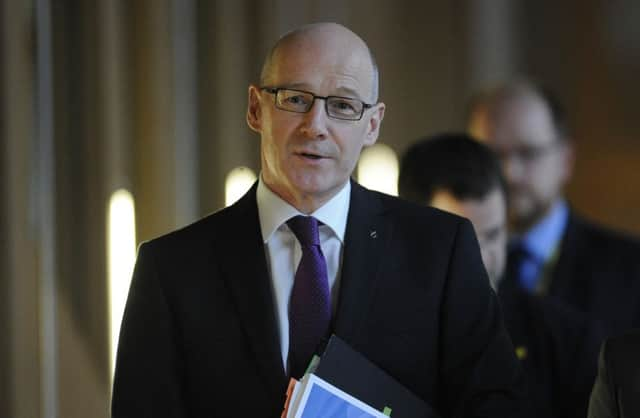Smith Commission members back John Swinney in powers row


The deadline for a deal, originally tomorrow, now looks likely to be put back as both sides continue to negotiate.
Labour MSP and Smith Commission member Iain Gray told BBC Radio Scotland’s Good Morning Scotland programme: “To a degree, I think I largely agree with John Swinney on this position.
Advertisement
Hide AdAdvertisement
Hide Ad“What’s being talked about is a population trend which is in place and would be nothing to do with decisions that had been taken in Scotland, so, in my view, it does have to be factored into the discussions.”
The governments must agree on how Scotland’s budget - the block grant - should be adjusted to take into account the new powers.
Any deal must meet the principles of taxpayer fairness and “no detriment” - the idea that neither government should gain or lose financially simply as a result of the decision to devolve.
The Scottish Government believes a method known as per capita indexed deduction, which would take into account the fact that Scotland’s population is growing more slowly than the rest of the UK, is the best way of meeting the no detriment principle.
It claims a bad deal, which fails to take population into account, could cost Scotland billions of pounds in the long-term.
The UK Government says a deal must be fair to all taxpayers and “no detriment” does not mean “no risk”.
Former Liberal Democrat leader Tavish Scott, who also asat on the Commissin also backes the Scottish Government position.
He said: “We are told that Scotland’s population will grow more slowly than other parts of the UK, so therefore, yes, it is logical that the new fiscal framework takes that into account. That would be a reasonable interpretation of no detriment.”
Advertisement
Hide AdAdvertisement
Hide AdGreen member Maggie Chapman said: “We heard time and time again during the referendum campaign that it would be better if Scotland voted No because we were all in this together.
“Under that principle, then, yes, the UK Government has a responsibility to ensure that whether it is population, whether it’s other factors, Scotland does not face detriment.”
Smith member Adam Tomkins, a Conservative, said: “The no detriment principle is a principle that must be applied equally to taxpayers in Scotland and to taxpayers in the rest of the United Kingdom, it is not a one-way insurance policy.”
Their comments come as a report by Westminster’s Scottish Affairs Committee warned the new funding deal for Scotland must not leave the country with risks it does not have the powers to mitigate for.
It found greater financial responsibility must be matched by enhanced borrowing powers and the principles of “no detriment” and taxpayer fairness must be met.
The committee called on the two governments to explore an adjusted version of the method favoured by Scottish ministers and recommended the operation of the new fiscal framework be reviewed after four years.